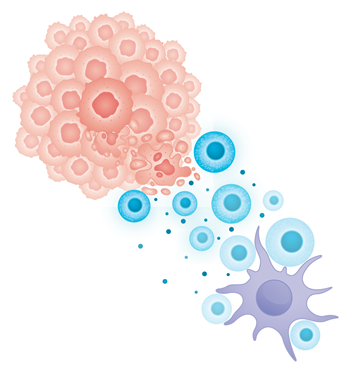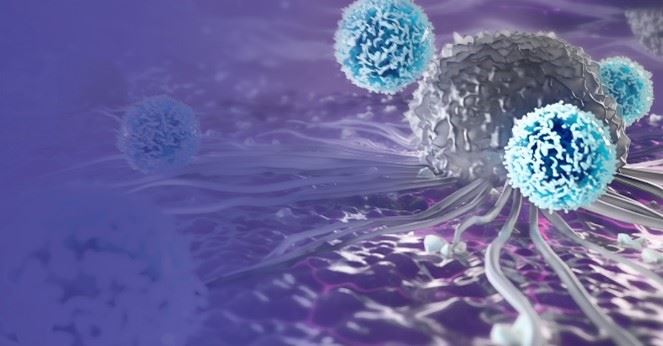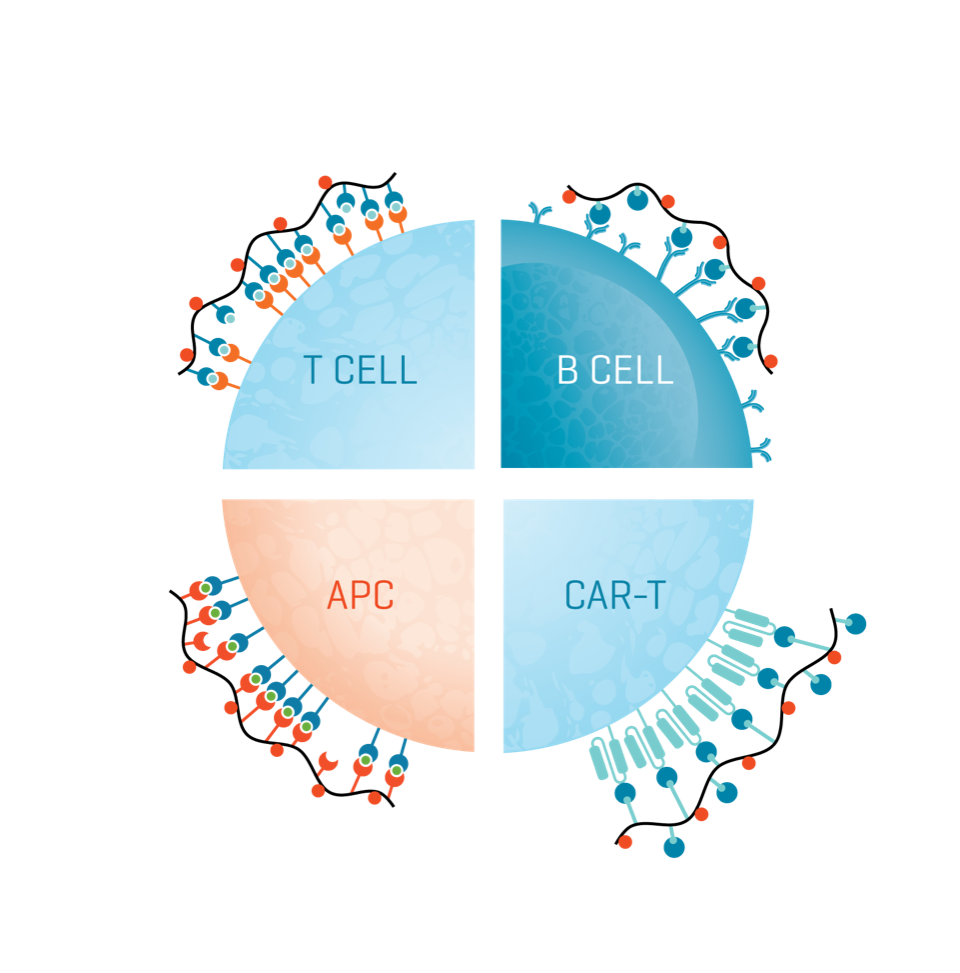Download our comprehensive list of published human cancer T-cell epitopes.
Harnessing the Immune System in the Fight Against Cancer

All Cancer Therapy is Antigen-Specific Immunotherapy
Most current FDA-approved and investigational immunotherapies for cancer are designed to augment, activate, or replace antigen-specific T-cell immunity.
The ability to experimentally detect antigen-specific responses in T cells is a critical readout in demonstrating efficacy and investigating side effects of these treatments.
Monitor Antigen-Specific Immune Cells in Cancer
The detailed monitoring of cancer-specific T-cell populations in patients is a key aspect of immunotherapeutic strategies.
- Detect existing or induced immunity to demonstrate if T cells towards specific target antigens are active and expanding.
- Track patient response to treatments and identify biomarkers that predict response.
- Monitor the full range of neoantigen-specific T cell responses in patients treated with checkpoint inhibitors.
- Understand clonal expansion and phenotype of antigen-specific T cells.
- Investigate immune escape and side-effects.
- Reveal modes of action for potential new therapies.


Unravel the Complexity of the Cellular Immune Response
Reactions of the immune system to the presence of cancer cells are complex and varied. A diversity of immune cells interact in a collective response, each with different receptor affinities to specific tumor antigens.
Dextramer® reagents can reliably detect and characterize tumor-specific T cells based on the epitope they recognize, including rare or low-affinity CD8+ and CD4+ T cells.
To support precision immune monitoring in cancer, we provide:
- Dextramer® reagents and predefined panels of Dextramer® to detect cancer-specific T-cells by flow cytometry.
- dCODE Dextramer® reagents for analysis of antigen-specific T cells at the single-cell level.
- Klickmer® for detection of antigen-specific B cells.
- Dextramer® for detection of CAR-T cells.
 DISCOVER THE DEXTRAMER® DIFFERENCE
DISCOVER THE DEXTRAMER® DIFFERENCE
The Importance of Defining Suitable Tumor Antigens
Tumor cells express antigens on the cell surface as part of the MHC complex or release them into the bloodstream. Specific tumor antigens are valuable diagnostic markers and used in the development of immunotherapeutics and cancer vaccines. Defining suitable tumor antigens is essential for triggering efficient and durable immune responses against cancer.
Tumor antigens are generally classified into two categories based on their expression pattern:
- Tumor-Specific Antigens (TSA) - primarily found in cancer cells, TSA are mutation-derived neoantigens and can cause the tumor due to mutation in a conserved gene e.g. p53.
- Tumor-Associated Antigens (TAA) - highly expressed on tumor cells but may also be found at lower levels on healthy cells, TAA are produced due to a mutation in genes unrelated to tumor formation.
Other tumor antigens include tissue differentiation antigens, cancer-germline antigens, and oncofetal antigens.
 Discover Solutions for Epitope Discovery and Validation
Discover Solutions for Epitope Discovery and Validation
T cells
T cells that have infiltrated a tumor (TILs) can be isolated, activated, expanded, and reinfused into the patient to mount a strong attack on the tumor. The same cells may also be equipped with a new receptor (TCR) to target specific cancer antigens.
CAR-T cells
T cells engineered with cancer-targeting chimeric antigen receptors (CARs), with the ability to target a specific protein. They are designed to recognize highly specific antigens and either kill tumor cells or modulate immune responses.
NKT cells
 Activated natural killer T (NKT) cells fight cancer directly in an antigen-specific cytotoxic attack. They can also activate other immune cells. The activity of these unique cells is CD1d-dependent, opening the opportunity to detect them in samples.
Activated natural killer T (NKT) cells fight cancer directly in an antigen-specific cytotoxic attack. They can also activate other immune cells. The activity of these unique cells is CD1d-dependent, opening the opportunity to detect them in samples.
B cells
B cells produce antibodies and act as potent antigen-presenting cells to induce antitumor-specific T-cell responses. With well-defined epitopes and sensitive reagents, diverse B-cell populations can be stratified and their role in immunity revealed.
Mouse Cancer Epitopes
Download the comprehensive list of murine models and cancer T-cell epitopes.
Case Studies
Discover the impact of Dextramer® technology in case studies in the field of cancer research
Publications
Learn about the uses, experiences, and finding in cancer research in our list of publications.

